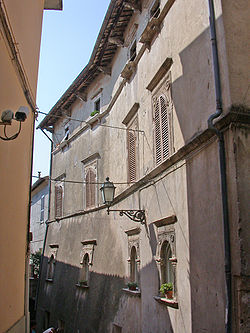Fara in Sabina: Difference between revisions
expanded |
typo corrected |
||
| Line 48: | Line 48: | ||
==History== |
==History== |
||
The area wa already inhabited in prehistoric times, as attested by several archaeological findings from the mid-[[ |
The area wa already inhabited in prehistoric times, as attested by several archaeological findings from the mid-[[Palaeolithic]] and the late [[Bronze Age]]s. |
||
Between the 9th and the 6th centuries BC, a settlement of the [[Sabines]], identified with the city of ''Cures'', existed here, and was inhbited also in Roman times. Remains from it include the baths, a small theatre and terraces for agriculture. |
Between the 9th and the 6th centuries BC, a settlement of the [[Sabines]], identified with the city of ''Cures'', existed here, and was inhbited also in Roman times. Remains from it include the baths, a small theatre and terraces for agriculture. |
||
Revision as of 15:12, 29 July 2010
Fara in Sabina | |
|---|---|
| Comune di Fara in Sabina | |
 Palazzo Orsini. | |
| Country | Italy |
| Region | Latium |
| Province | Rieti (RI) |
| Frazioni | Baccelli, Borgo Quinzio, Canneto Sabino, Coltodino, Corese Terra, Passo Corese, Farfa, Prime Case, Talocci |
| Government | |
| • Mayor | Vincenzo Mazzeo |
| Area | |
• Total | 54.9 km2 (21.2 sq mi) |
| Elevation | 482 m (1,581 ft) |
| Population | |
• Total | 13,142 |
| • Density | 240/km2 (620/sq mi) |
| Time zone | UTC+1 (CET) |
| • Summer (DST) | UTC+2 (CEST) |
| Postal code | 02032 |
| Dialing code | 0765 |
| Website | Official website |

Fara in Sabina is a comune (municipality) in the Province of Rieti in the Italian region Latium, located about 40 km northeast of Rome and about 25 km southwest of Rieti.
Fara in Sabina borders the following municipalities: Castelnuovo di Farfa, Montelibretti, Montopoli di Sabina, Nerola, Toffia. The Abbey of Farfa is located in the commune's territory.
History
The area wa already inhabited in prehistoric times, as attested by several archaeological findings from the mid-Palaeolithic and the late Bronze Ages.
Between the 9th and the 6th centuries BC, a settlement of the Sabines, identified with the city of Cures, existed here, and was inhbited also in Roman times. Remains from it include the baths, a small theatre and terraces for agriculture.
The origins of the modern town date however to Lombard times (late 6th century AD), as it has been supposed from the presence of the Lombard word fara ("family clan") in the name. A castle is known from 1006, and from 1050 Fara was a possession of the Abbey of Farfa; later it was a fief of the Orsini.
Twin towns
 Santa Vittoria in Matenano, Italy
Santa Vittoria in Matenano, Italy Villemur-sur-Tarn, France
Villemur-sur-Tarn, France
References
- ^ "Superficie di Comuni Province e Regioni italiane al 9 ottobre 2011". Italian National Institute of Statistics. Retrieved 16 March 2019.
- ^ All demographics and other statistics: Italian statistical institute Istat.
- ^ "Popolazione Residente al 1° Gennaio 2018". Italian National Institute of Statistics. Retrieved 16 March 2019.
External links


